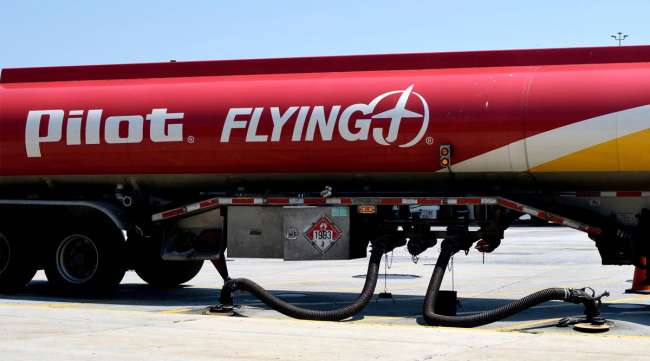Bloomberg News
Pilot Flying J Changes Corporate Name, Expands Into Energy Market

[Stay on top of transportation news: Get TTNews in your inbox.]
America’s largest truck-stop company is rebranding as it grows its market share in both retail fuel and energy divisions.
Pilot Flying J is changing its corporate name and structure to be called Pilot Co. after a two-year push into the energy business, a growth area that has included building out a Houston office, acquiring pipeline and storage assets and buying fuel from across the world.
In part one of a two-part exploration of autonomous technology today, our latest RoadSigns podcast revisits conversations with CEOs Alex Rodrigues of Embark and Cetin Mericli of Locomation. Hear them explain what testing automated trucks and developing platooning technology has taught them about the road ahead — and get new perspective with host commentary. Listen to a snippet from Rodrigues above, and to hear the full episode, go to RoadSigns.TTNews.com.
“We had to change and evolve with the times,” Pilot Co. CEO Jimmy Haslam said in an interview. “We got to the point where we started looking around and saying, what could be the next growth vehicle? We didn’t want to do something that was totally different. So we took a step back and thought, what could we do to leverage our current platform?”
The solution was an expansion into the energy sector, increasing its so-called vertical integration. Under the leadership of Chief Strategy Officer Shameek Konar — an alum of Castleton Commodities International, Mercuria Energy Trading SA and Goldman Sachs Group Inc. — Pilot has shifted from solely focusing on its travel centers and retail fuel sales to also snatching up midstream infrastructure and expanding into water disposal, blending, crude hauling and other business segments.
Energy Footprint
The moves come after Warren Buffett’s Berkshire Hathaway Inc. paid $2.76 billion for a 38.6% stake in the Knoxville, Tenn.-based firm in 2017, with plans to increase that stake to 80% by 2023.
Last year, Forbes ranked Pilot as the No. 10 largest private company in the U.S. It also ranked No. 33 on Transport Topics’ 2019 Top 100 Private Carriers list, logging 1,061 tractors, 35 trucks and 1,405 trailers.
The firm, which operates more than 750 travel centers across the U.S. and Canada, already supplies about one-sixth of the nation’s diesel consumption. Now, it’s focused on widening its footprint. Last year, it acquired NGL Energy Partners LP’s TransMontaigne Products Services, giving Pilot an increased presence on the Colonial Pipeline, a vital conduit connecting the Gulf Coast and East Coast. The firm can access 21 terminals along the pipeline, shipping some 80,000 barrels a day.
Pilot also took a majority stake in Pro Petroleum a year prior, giving the company access to the West Coast as well as Arizona, Nevada and West Texas markets. The firm has the third-largest tanker fleet in North America with more than 1,500 trucks able to move energy products including diesel, gasoline, diesel exhaust fluid, biodiesel, crude, water and sand.
For now, the company’s expansion plans don’t include operating a refinery, but Pilot’s evaluating options for protecting its fuel margins, including an equity interest, said Konar.
Want more news? Listen to today's daily briefing:




